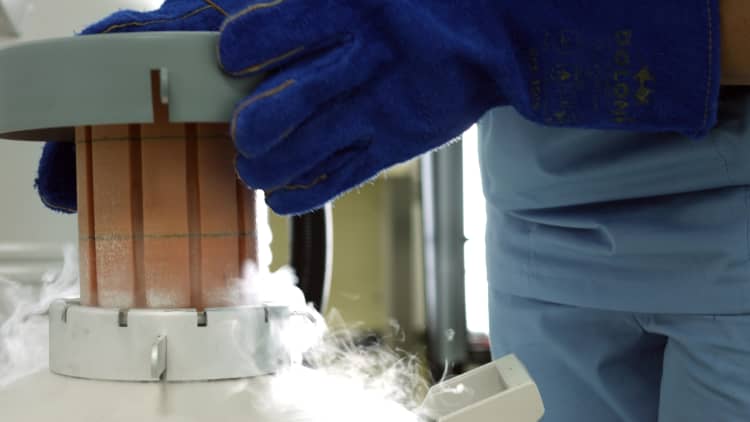Kristina Simmons, a chief of staff and investor at Khosla Ventures, is one of many women who decided to freeze her eggs.
Thousands of women do this every year, for a variety of reasons: Because they don't want kids now but worry that their eggs will no longer be viable when they decide to try, because they haven't met the right partner yet, to hedge against the possibility of health problems later on or for other reasons.
But Simmons stands out among her peers: She's one of a few women who are investing in start-ups that aim to solve many of the biggest problems with egg freezing today.
In going through the process herself, Simmons saw a lot of room for improvement. For many women, especially those who aren't covered at all or only partially by insurance, it costs thousands of dollars out-of-pocket. And it's also a very involved process that requires hormone injections and regular blood draws at the clinic.
In a bid to change that, Simmons, who's in her early thirties, has invested in a couple of start-ups in the space. Overture, a biotechnology start-up that is also backed by Salesforce CEO Marc Benioff, aims to use technology to make the egg freezing process more affordable and accessible. Higia, a wearable that can be placed beneath a bra to detect breast cancer early and is also moving into fertility-tracking, which might help women figure out if and when they should look into egg freezing.
Simmons said she's currently in talks to invest a handful of other companies, also related to egg freezing and women's health more broadly. "I'm passionate about rethinking this for women altogether," she said.
The number of women opting to freeze their eggs has skyrocketed since 2012, when the American Society of Reproductive Medicine stopped classifying it as an experimental procedure. In 2009, only 500 women underwent egg freezing cycles, but in 2016, there were 9,000. That's the most recently available data, but that number is expected to be far higher today given the bump in insurance coverage for egg freezing. As a result, U.S. fertility clinics generated close to $2 billion in revenue in 2017, and they're popping up across the country.
Many employers in the tech industry and beyond are looking to retain talent by offering some level of coverage for egg-greezing. These now include Apple, Alphabet, Microsoft, Yahoo and Uber, to name just a few.
David Schlanger, the CEO of a company called Progyny which works with many of these large employers to help women access these benefits, said that roughly 1 in 8 women struggle with fertility. "Women are waiting longer and longer to have children for the first time in history," he said.
Despite the need, women's health, or "femtech," has historically been underfunded by venture capitalists. According to Pitchbook, total investments globally barely cracked $100 million five years ago. That's in part because the venture capital industry is more than 90 percent male, and as some recent reports have noted, it's such a challenge to get funded that some female entrepreneurs are resorting to bringing their husbands along to pitch meetings so they can get taken seriously.
But that's starting to change. Simmons is among many women who are motivated to do more in women's health because of both the business opportunity, and the need.
Piraye Yurttas Beim, a scientist and entrepreneur, started her own company, Celmatix, after realizing that most women had no window into their fertility.
So her company developed a genetic test, dubbed Fertilome, to screen women for potential fertility risk factors. Beim was one of the early adopters of the test. And the results prompted her to fast track her own pregnancy plan.
"I found was that I had inherited a genetic risk factor for premature menopause," said Beim. "And I think of the decisions I would have made a bit differently when I was in my twenties if I had known that my clock was ticking a bit faster than the average woman."
Beim is hoping that someday,women will take contraceptives spiked with a drug that helps them preserve their ovarian function. And that's just one of so many opportunities for women in the fertility space, and beyond.
The science and the tools are there, she says, but "we're really just missing the dollars to build these companies and build this future for women."




